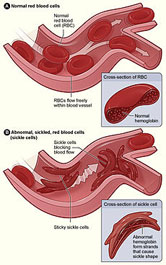
Sickle Cell: Why Blacks need to be more aware
Sickle cell disease is an inherited red blood cell disorder affecting people of all races, not just African Americans
By Dr. Althea Grant, BDO Sickle Cell Expert
Sickle cell disease is an inherited red blood cell disorder affecting people of all races, not just African Americans.
Healthy red blood cells are round, and they move through small blood vessels to carry oxygen to all parts of the body. In someone who has sickle cell disease, the red blood cells become hard and sticky and look like a C-shaped farm tool called a “sickle.” The sickle cells die early, which causes a constant shortage of red blood cells.
It can also cause pain.
Pain is the most common complication of SCD. When sickle cells travel through small blood vessels, they can get stuck and prevent blood flow and oxygen from reaching vital organs. This causes pain that can start suddenly, be mild to severe, and can last for any length of time.
More than three million people in the United States have sickle cell trait, meaning they carry the sickle cell gene that allows them potentially to pass the disease on to their children if their partner also has sickle cell trait.
Thanks to newborn screening tests, all babies born in the United States are screened for abnormal hemoglobin, a protein in red blood cells that carries oxygen. These tests show if your baby has sickle cell trait, sickle cell disease, or any other abnormal hemoglobin. Each year, 1,800 – 2,000 babies are born with sickle cell disease. About 90,000 to 100,000 Americans are living with sickle cell disease.
People with sickle cell disease can live full lives and enjoy most of the same activities as other people, but they often experience many health challenges and complications that can be life-threatening. If you have sickle cell disease, it’s important to learn how to stay as healthy as possible.
Download CDC’s Living Well with Sickle Cell Disease Self-Care Toolkit from our website to help you get started. http://www.cdc.gov/ncbddd/sicklecell/documents/LivingWell-With-Sickle-Cell%20Disease_Self-CareToolkit.pdf
If you have questions about sickle cell disease or sickle cell trait:
· Talk with your doctor and family to find out your sickle cell disease status.
· Learn more about sickle cell disease www.cdc.gov/ncbddd/sicklecell/
· Follow me on Twitter twitter.com/drgrantcdc
If you want to know how you can help:
· Get involved in local community activities to raise awareness and education www.sicklecelldisease.org/
· Consider donating blood (American Association of Blood Banks http://www.aabb.org/) or registering to become a bone marrow donor at www.marrow.org
Althea Grant, PhD, is Chief of the Epidemiology and Surveillance Branch in the Division of Blood Disorders of the National Center on Birth Defects and Developmental Disabilities. Dr. Grant has specifically been recognized for her contribution to developing public health programs and resources for sickle cell disease and sickle cell trait.
